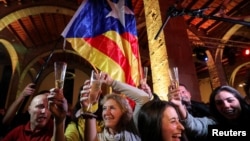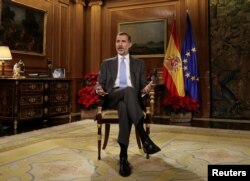Spain's central government can block Catalan secessionists from forming a new regional government despite their victory in last week's local elections, according to senior members of the ruling Popular Party (PP) who say that the independence movement's parliamentary majority is fragile.
Central authorities could use the incarceration and exile of a score of top secessionist lawmakers to "neutralize their edge in parliament," according to the sources. They could also apply direct rule provisions to leverage a unionist coalition government headed by center-right leader Inés Arrimadas, who won the largest share of votes (27%) of the seven parties that contested the elections.
Spanish Prime Minister Mariano Rajoy hinted at such a plan at a press conference last Friday when he was asked if he would agree to meet Catalan president Carles Puigdemont, who is in Belgium.
"The one with whom I will meet is Ms. Arrimadas," replied Rajoy.
Unionists lack seats
Early this week, PP Secretary General Fernando Maillo publicly urged Arrimadas "not to give up" in trying to form a government.
Arrimadas said that she cannot do so because she lacks votes in the current parliament, where her Ciudadanos party holds 36 seats as opposed to 70 held by secessionist groups.
But spokesmen for Ciudadanos, as well as leaders of Spain's mainstream opposition socialist workers' party, which holds 17 seats in the Catalan parliament, have said that they would support continuing the direct rule regime imposed by Rajoy when he dissolved the regional government last month.
Spain's King Felipe delved into the controversy during his Christmas message, saying "the solution cannot be a return to the conditions that brought on confrontation."
Several secessionist leaders criticized the king for "justifying repression."
Rajoy told the press that the independence movement is losing momentum. He said last Friday that secessionist parties lost seats in recent elections and that their share of the vote had dropped by more than 1% since previous elections in 2015.
Unionist parties, on the other hand, won the popular vote for possibly the first time. They received 3.5% more votes than the secessionists by capturing 58% of 450,000 new voters in what was a record turnout.
The separatists managed to maintain their parliamentary majority thanks to local districting rules that allow smaller towns - where support for independence is strongest - proportionately higher representation than the main city of Barcelona where the unionists won.
Can't vote from jail or exile
Spain's central government could obstruct the secessionists from mustering their parliamentary majority of only two seats.
Thirteen members of the last Catalan government are currently in prison and would need to obtain court authorizations to cast votes in parliament or appoint substitutes.
Puigdemont and four other officials who escaped to Belgium can't vote unless they return to face arrest.
Five more indictments on sedition charges were issued against reelected secessionist lawmakers last week.
If a government cannot be voted in by absolute majority by the January 20 deadline set by Rajoy, it then passes to a simple majority, which Ciudadanos could form with the socialists and PP.
Growing divisions among the secessionists could also play into the central government's hands.
The jailed vice president of Catalonia's dissolved government, Oriol Junqueras, is claiming the presidency if Puigdemont does not return. Junqueras' party, Catalan Republican Left, scored only a few less votes than Puigdemont's group, Together for Catalonia, which has proposed a special law enabling their leader to govern from abroad.
According to Spanish press reports on Tuesday, Junqueras is prepared to renounce his commitment to "unilateral independence" if he is allowed out of jail to challenge Puigdemont.
The secessionist majority depends on four parliamentary votes of the radical separatist CUP, which has threatened to turn against any government which renounces full independence.













